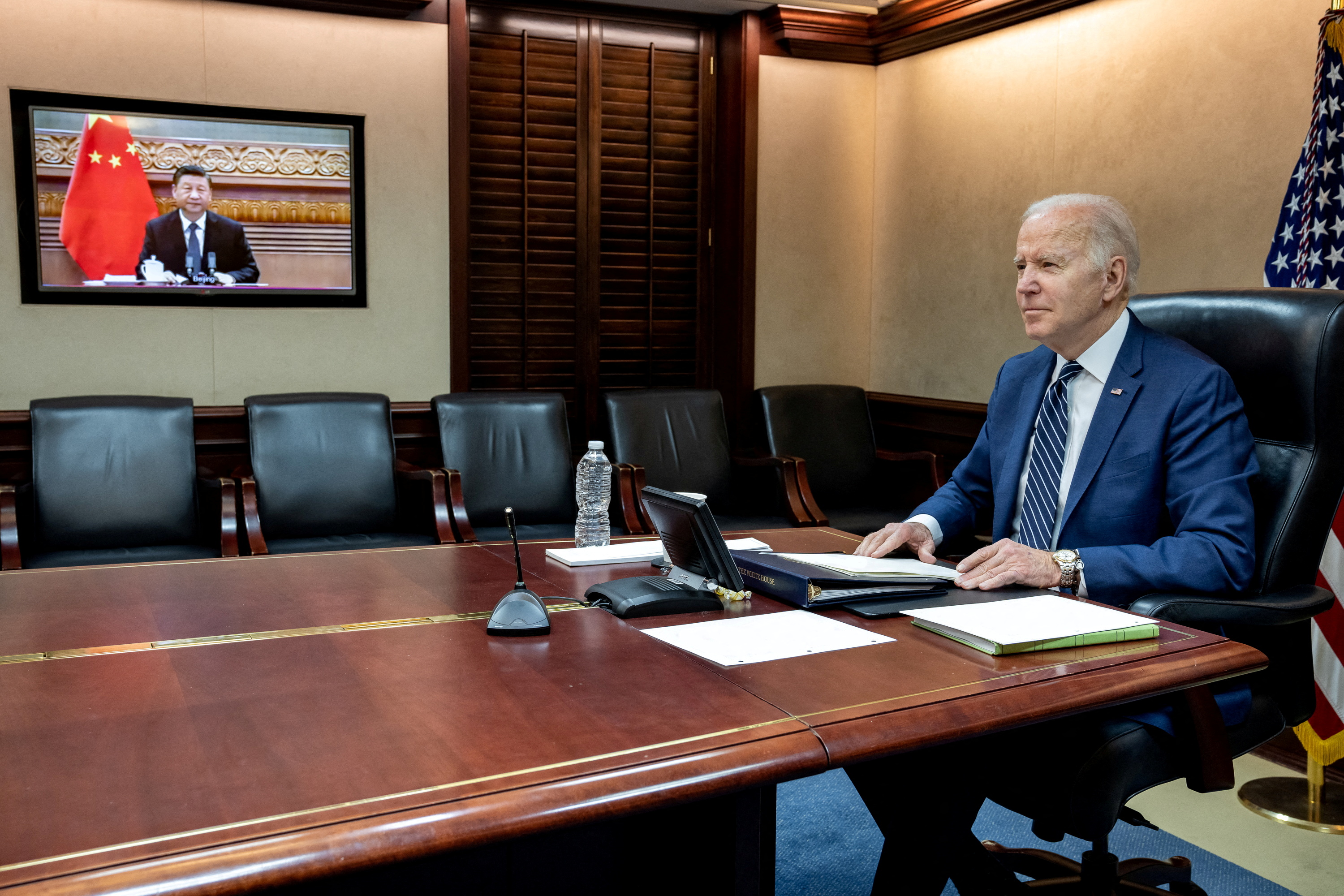US, China call for diplomatic solution to Ukraine war but differing views remain
Sign up now: Get ST's newsletters delivered to your inbox

US President Joe Biden (right) holds virtual talks with Chinese President Xi Jinping at the White House, on March 18, 2022.
PHOTO: REUTERS
WASHINGTON - The United States and China called for a diplomatic resolution to the war in Ukraine during a call between its leaders on Friday (March 18), but differed on assigning blame for the conflict and over Beijing's role in pressuring Moscow to halt its invasion.
China's President Xi Jinping told his US counterpart Joe Biden that "all sides need to jointly support Russia and Ukraine in having dialogue and negotiation that will produce results and lead to peace", according to a Chinese foreign ministry statement released after the two-hour video call.
Mr Xi added that China had put forward a six-point initiative on the humanitarian situation in Ukraine, and was ready to provide further humanitarian assistance to Ukraine and other affected countries.
Mr Biden detailed the efforts of America and its allies to prevent and then respond to "Russia's unprovoked invasion of Ukraine", including by imposing costs on Russia, the White House said in a statement.
It added that Mr Biden "described the implications and consequences if China provides material support to Russia as it conducts brutal attacks against Ukrainian cities and civilians".
Beijing has denied reports that it was willing to provide Moscow with military or economic aid.
A senior administration official who spoke to reporters after the call declined to specify exactly what sort of penalties the US would impose on China if it armed Moscow or helped it circumvent international sanctions.
The US official, who spoke on condition of anonymity, also did not say how Mr Xi responded to Mr Biden.
But Beijing, which is wary of getting hit by Russia-related sanctions, criticised international sanctions as a solution, highlighting their impact on global stability and the livelihoods of billions.
"Sweeping and indiscriminate sanctions would only make the people suffer. If further escalated, they could trigger serious crises in global economy and trade, finance, energy, food, and industrial and supply chains, crippling the already languishing world economy and causing irrevocable losses," said the Chinese statement.
Analysts noted that Beijing continued to refuse to condemn Russia for its invasion, as it balances between presenting itself as a responsible superpower while staying aligned with Moscow.
Instead, Beijing alluded to what Moscow has called "legitimate security concerns" over Nato expansionism near its borders, which Russian president Vladimir Putin cited as a reason for his military campaign against Ukraine.
"The US and Nato should also have dialogue with Russia to address the crux of the Ukraine crisis and ease the security concerns of both Russia and Ukraine," said the Chinese statement, adding that an "enduring solution" would be for major countries to respect each other and reject a Cold War mentality.
Still, Beijing did put some distance between itself and Moscow, calling for an end to hostilities as soon as possible. "China stands for peace and opposes war," said its statement.
"Overall, Xi's remarks suggest a reduced tail-risk of full Chinese support for Russia and the retaliation this would trigger from Washington," said Eurasia Group analysts in a note after the call.
They added that the potential for US-China cooperation on a diplomatic resolution of the crisis was slim.
While Mr Xi called for the US and Nato to open a dialogue with Russia, "the idea of such a dialogue is a non-starter in Washington", the analysts said.
Stimson Center China program director Yun Sun told The Straits Times that from the US perspective, "China is choosing to side with Russia, against its stated principles such as on sovereignty and territorial integrity".
Mr Biden and Mr Xi, who last spoke in November, also agreed on the importance of maintaining open lines of communication to manage the competition between our two countries, said the White House.
The issue of Taiwan, which China regards as a breakaway province to be reunited with the mainland, was also discussed.
Mr Biden "reiterated that US policy on Taiwan has not changed, and emphasised that the United States continues to oppose any unilateral changes to the status quo," said the White House, a point which the Chinese foreign ministry also highlighted in its statement.

Ukrainian police carry a body away from a five-storey residential building that partially collapsed after shelling in Kyiv, on March 18, 2022.
PHOTO: AFP
Said Ms Sun: "The Chinese statement reads almost positively - that the US restated its One China policy, and committed to not seeking a new Cold War with China. That's what the Chinese wanted to hear."
Overall, whether Mr Biden succeeded in convincing Mr Xi to press Mr Putin to end his invasion remains to be seen, said analysts.
"US officials are deeply frustrated with China's position and believe Beijing has actively ignored US entreaties and warnings - and it remains to be seen if the direct message from Biden will alter this," said the Eurasia Group analysts.
Said the US official: "Our view is that China will make its own decisions."


